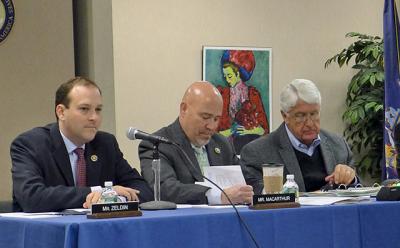Question Science Behind Fish Quotas

Mid-Atlantic fishermen and their advocates told four members of Congress on Monday that inaccurate stock assessments needlessly limit their catch and endanger their livelihood as the House of Representatives’ Committee on Natural Resources held an oversight hearing in Riverhead.
Bonnie Brady of the Long Island Commercial Fishing Association and Captain Joe McBride of the Montauk Boatmen and Captains Association were among those providing testimony to Representative Lee Zeldin of New York’s First Congressional District and three members of the natural resources committee. Witnesses also included representatives of fishing and seafood trade associations and a scientist from the National Oceanic and Atmospheric Administration, which manages fish species in federal waters.
At issue in the field hearing, called Restoring Atlantic Fisheries and Protecting the Regional Seafood Economy, were the science and data collection used in management of fish stocks.
Along party lines, the committee members either defended or disparaged NOAA and the National Marine Fisheries Services’ stewardship and stock assessments, from which quotas are determined. They disagreed on assessments of striped bass and fluke, for which the Atlantic States Marine Fisheries Commission and the Mid-Atlantic Fishery Management Council have recommended 2016 harvest reductions of 25 and 29 percent respectively.
Ms. Brady asked the committee to direct the Northeast Fisheries Science Center to schedule a full benchmark assessment of the fluke stock in the first half of 2016, telling Mr. Zeldin and his colleagues that the recommended harvest reduction was based on outdated models and an inaccurate picture of the species’ health. She also asked that the Magnuson-Stevens Fishery Conservation and Management Act be amended to add a New York State Department of Environmental Conservation representative and another New York stakeholder to the New England Fishery Management Council.
She also asked the committee to ensure that the Senate introduce and pass a version of the Strengthening Fishing Communities and Increasing Flexibility in Fisheries Management Act, which the House passed in June. The Obama administration opposes the bill; a statement issued in May said that it would undermine the use of science-based actions to end and prevent overfishing. The Magnuson-Stevens Act, the statement said, already provides the flexibility needed to manage fisheries.
Mr. McBride told the committee that recreational fishermen should be allowed to catch striped bass in the Block Island Sound transit zone, an area of federal waters between swaths of state waters that he said posed a longstanding problem for anglers. Conservation of striped bass, stocks of which collapsed in the 1980s, has been effective, and the fishery is now “very viable,” he said. He also asked for continued support of a bill introduced by Mr. Zeldin that would clarify the landward boundaries of the exclusive economic zone area between Montauk, Block Island, and Point Judith, R. I.
Another witness, James Donofrio of the Recreational Fishing Alliance, complained about prohibitions on healthy stocks and “outright misinformation” from what he called the “environmental industry.” “Our industries are dying,” he said, “and it doesn’t have to be that way.” Ms. Brady agreed, as did Greg DiDomenico of the Garden State Seafood Association, who worried about use of the federal Antiquities Act to create marine reserves without input from fishermen or other stakeholders. Mr. DiDomenico also asked committee members to start an oversight process on both the Marine Mammal Protection Act and the Endangered Species Act.
Some committee members and witnesses disparaged the testimony of the NOAA representative, Paul Rago, insisting that the agency is not using best available science and its quotas are both exceedingly conservative and include additional “buffers” to compensate for incomplete science in its stock assessments. The committee’s chairman, Rob Bishop, a Republican from Utah, and Tom MacArthur, a Republican from New Jersey, repeatedly pressed Dr. Rago on the latter accusation. “You only look at factual findings, or make some assumptions to allow for incomplete science?” Mr. MacArthur asked.
“We are objective,” was the reply. “There are no explicit cushions that are built into the science for incomplete observations. We do look at scenarios related to alternative hypotheses about the environment.”
“That could include climate change?” Mr. MacArthur asked. Yes, was the reply.
The lone Democrat, Jared Huffman of California, defended NOAA and applauded its incorporation of climate science in fisheries assessments. “And I strongly disagree with those who have trivialized and criticized this plan, suggesting that it’s some kind of a radical climate-change strategy that is somehow at odds with best available science,” he said. “It is the best available science. Warming waters, ocean acidification, and species range shifts clearly show that you can’t have the best available fishery science without incorporating climate science.”
Mr. Huffman argued that “short-term sacrifices” by commercial and recreational fishermen have allowed stocks including bluefish, fluke, and black sea bass to rebuild, “with huge economic benefits.” The worst course of action, he said, would be “to abandon this science-based strategy before it’s had the chance to completely succeed.”
But Mr. MacArthur echoed the complaints of those who called stock assessments excessively conservative. “When you compound conservatism one layer on top of another on top of another . . . you can end up being so risk-averse that you do nothing,” he said. “I believe that’s what’s happening today in commercial and recreational fishing. We’re being overly conservative in the name of good science.”
An offhand quip from Mr. Bishop, who had previously stated that some of the witnesses’ testimony “will be wrong,” summarized his point of view. “I’ve found in my short life,” he said, “that science is not necessarily objective.”
